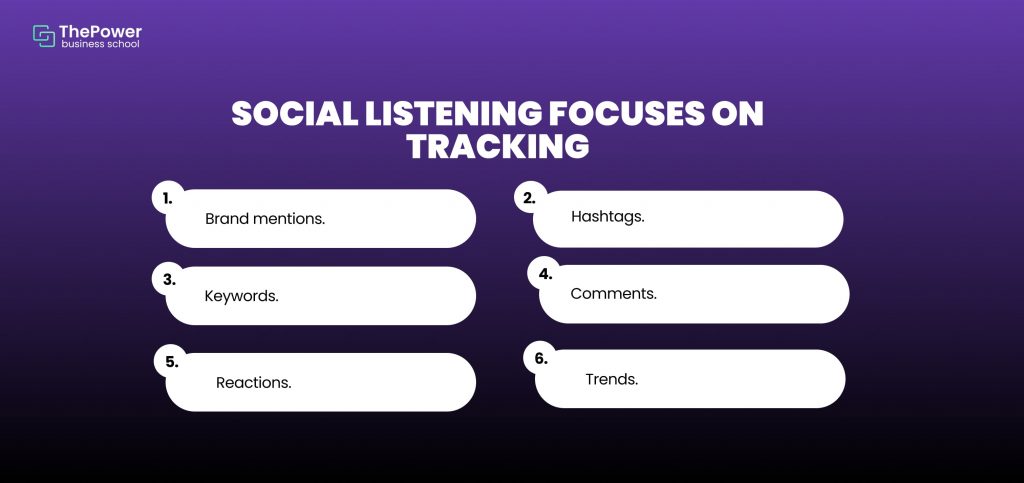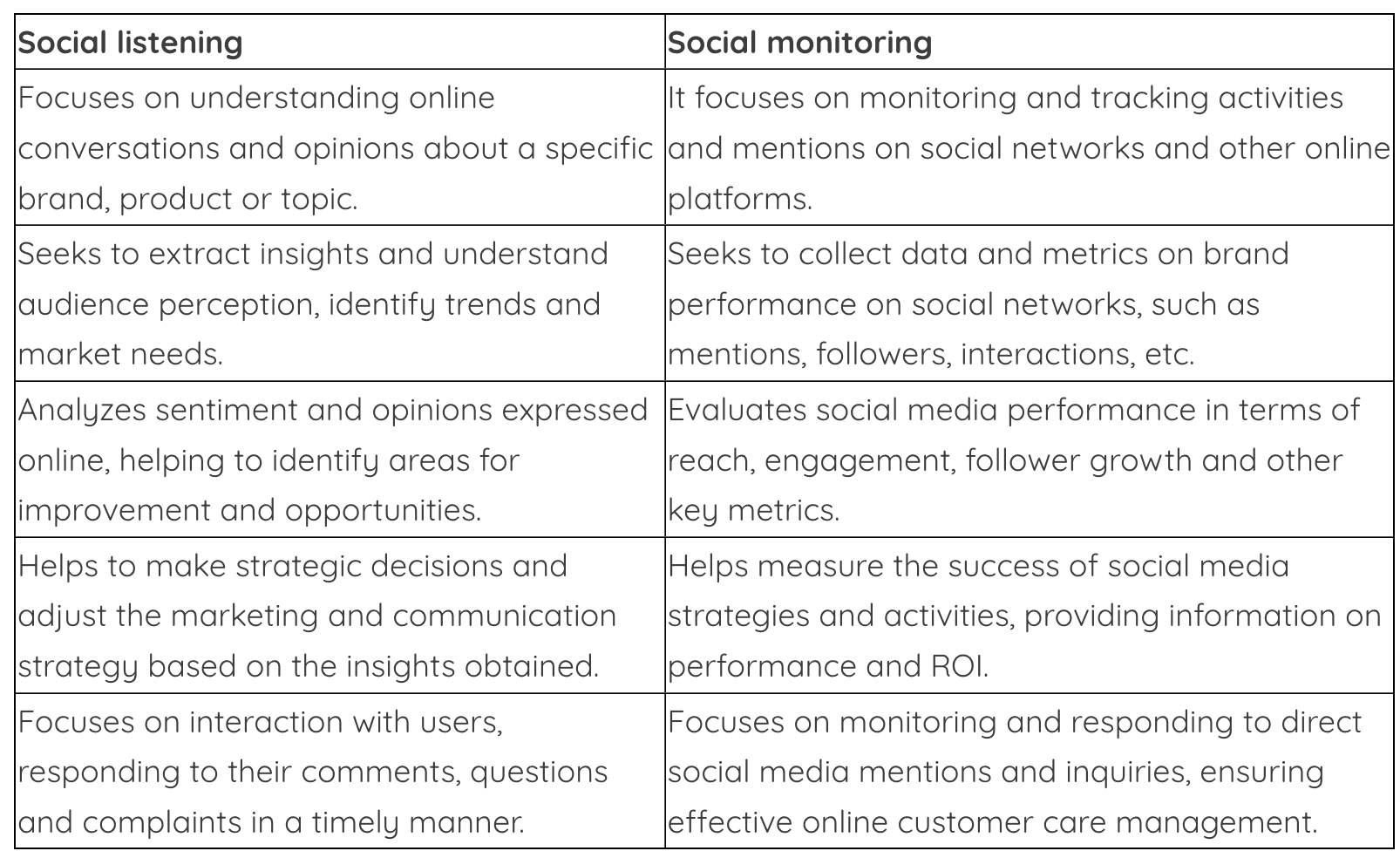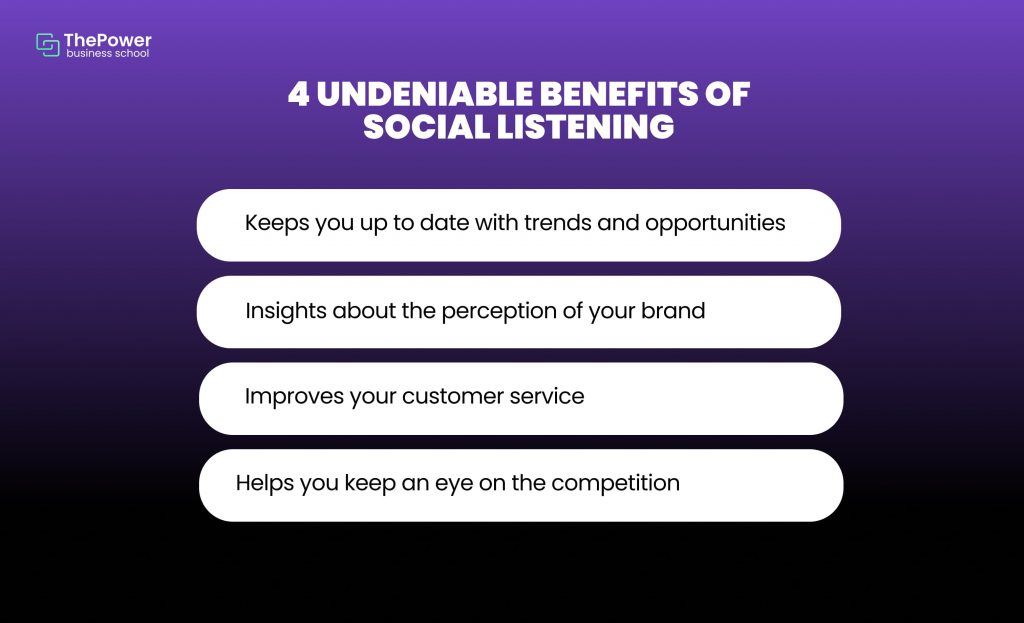
Franco Brutti
Social listening can tell you everything, absolutely everything about your target audience. And also about your brand perception.
Knowing how to listen to your audience is essential if you want to create personalized marketing strategies, empathize with your buyer persona and stand out in a competitive market.
This approach is a real differentiating factor for marketers. That's why we'll tell you what social listening is, what exactly it's for, how it's applied and how it differs from other strategic approaches.
What is social listening?
Social listening is a practice that consists of monitoring and analyzing online conversations and mentions about a brand, product, service or specific topic.
This technique is a great tool for understanding the opinions, needs and trends of the public on social networks and other online channels.
In other words, listen to everything your audience has to say in communities and networks, but also, to what users think when interacting with your brand and your content, beyond what the metrics say.
For this reason, social listening is focused on tracking and monitoring:
Brand mentions.
Hashtags.
Keywords.
Comments.
Reactions.
Trends.

What is social listening for?
Now that we know the definition, let's see what you can use social listening for in your strategies. These are 4 practical applications:
1. Knowing how, where, when and why your brand is - or isn't - being talked about
This approach will allow you to track every mention of your brand, as well as every interaction with it, whether positive or negative.
This will allow you to discover the true perception there is of your brand within the market. And above all, what your customers think about you, your products and services, especially when it comes to customer service and support.
It will also help you to know how effective your diffusion and brand awareness strategies are. And also, how well known -or unknown- your brand is in the market.
2. Getting to know your audience better
Because social listening will not only let you know the perception your potential customers have. It will also help you get countless insights from your target audience: invaluable insights to refine your strategies and maximize your conversions.
In addition, social listening is also an excellent method to innovate your products and services.
Just as you will be able to improve your strategies, you will also gain a great competitive advantage in the long term. This will help you to devise innovative solutions and products that DO respond to the needs of your target audience.
3. Getting to know your market and competitors better
You can apply this same approach to track your competitors' brand interactions and mentions.
You can connect all this data with your metrics and statistics to know which brand has more acceptance within the market. You can also track your competitors' content, positioning and, of course, user opinions.
You can also use this approach to detect trends more quickly. For example, you can track specific keywords related to your brand, and your products and services.
This way you will immediately see if one of the keywords you track becomes a trend, and you can use this to your advantage.
4. Improving your brand and its reputation
Part of getting to know your audience is listening to their criticisms, observations and complaints.
While it's great to receive positive reviews, negative reviews and comments are the best insights to improve your offers and strategies.
And social listening will allow you to track, monitor, analyze, process and leverage all of these interactions to your brand's advantage.
For some, the best type of marketing lies in good customer service. If your customer service is poor, social listening will help you improve it. And it will even help you improve your brand's reputation and market position.
Differences between social listening and social monitoring
Social monitoring has a rather similar approach to social listening. In fact, they can complement each other perfectly in a variety of scenarios, so we've created a comparison chart to explain their differences:

4 undeniable benefits of social listening
1. Keeps you up to date with trends and opportunities
Staying current in the digital world is challenging for small and large businesses alike.
With the right methods, social listening will help you track and follow trends more accurately. And by giving you a better understanding of market trends and your audience, it will help you position yourself at the forefront of your market.
2. Insights into your brand perception
It's easy to get carried away with statistics, but you also need to listen to what your customers and potential buyers are saying. And of course, to the perception of your brand in the marketplace.
Metrics are a great help, but social listening will give you an objective, global and real vision of what customers think of your brand. A less biased, more realistic and more beneficial vision for your strategies.
3. Improves your customer service
Because through customer and user feedback, you will know exactly what to correct when interacting with them.
Also, you will know how to communicate effectively with your followers. And even how to create and manage an active community.
In addition, with the data obtained from social listening, you will be able to better respond to user interactions and get more leads, and eventually, more customers for your business.
4. Helps you keep an eye on the competition
Just as it allows you to listen to everything your target audience has to say, social listening also helps you to monitor your competition.
Not only will you get to know your competitors better. You will also be able to analyze their strengths and weaknesses more effectively, monitor your competitors' positioning, their most successful content, viral trends and mistakes to avoid.

How to use social listening + 5 practical tips
Here are some tips on how to implement social listening in your different strategies.
1. Choose the right tools
The first thing is to define what your KPIs are. Then, you can choose the tools to analyze them.
When we talk about social listening, the best tools to collect data will always be your social media analytics.
However, to make the best use of all this data, we suggest using a social media management suite.
This way, you will be able to gather the metrics of your networks in one place. In addition, you will have a wide variety of resources and tools to use this data to your advantage.
2. Configure your search terms
This step is more than crucial.
The best place to start is your brand name, as well as your products, services and location. At the same time, you can use the pain points and needs of your target audience and choose terms that fit what you offer.
For example, let's say you have a travel agency specialized in cruises. Terms related to "travel agency" and "cruise travel" and the destinations you can offer are an excellent starting point.
From here, you can opt for variations, synonyms and related terms.
3. Analyze and extract insights from your audience
Once you've defined your terms, it's time to take action and start collecting as many insights as possible.
You can leverage a network management tool to process all your data more efficiently. In addition, you can automate analytics, reporting and notifications to speed up your workflows and improve your productivity.
So you'll have more information with less effort. And you'll be able to better leverage insights from your audience across your different networks.
4. Interact with your audience
This step is quite simple but effective.
Although data is an invaluable resource, one of the best ways to listen to your audience is to interact directly with them.
Be sure to respond to your audience's interactions on social media. Also interact on review sites, even if the reviews are not positive. This will raise your brand's credibility and bring you closer to your target audience.
We suggest you collect reviews and suggestions made through your customer service system. Remember, every insight is an opportunity to improve.
On the other hand, you can conduct surveys and create forms for users to give you their opinions and criticisms. And thus, get tons of information to improve your products, services and strategies.
5. Readjust your strategy as needed
It's not just about collecting and monitoring terms. The most important thing is to know how to take advantage of them to connect with your audience.
You can use all these insights in different facets of your business strategies. For example, you can conduct surveys to find out what new features to add to your products or to find out what products you should include in your repertoire.
And again, social listening is your best ally to improve your customer service. As long as you know how to listen to your users.
Ready to incorporate social listening into your strategies?
Social listening can provide you with endless opportunities to improve your marketing and business strategies. And it can even help you develop and innovate your brand and its products and services.
If you know how to listen to your audience and take advantage of their insights, you will have a colossal competitive advantage over your competitors. And you'll have everything you need to enhance your brand's reputation and credibility in the long run.
Now, we'd like to hear from you. Tell us what you think about social listening and what other strategies you know to monitor your brand's performance in the market.
Oct 14, 2022








